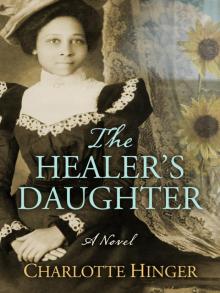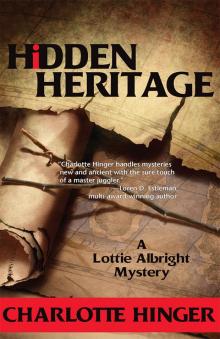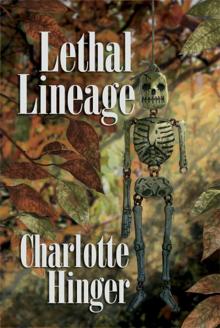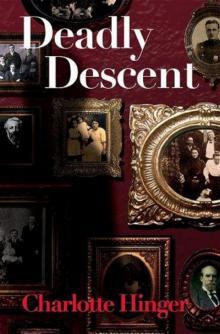- Home
- Charlotte Hinger
The Healer's Daughter
The Healer's Daughter Read online
THE HEALER’S DAUGHTER
THE HEALER’S DAUGHTER
CHARLOTTE HINGER
FIVE STAR
A part of Gale, Cengage Learning
Copyright © 2019 by Charlotte Hinger
All scripture quotations, unless otherwise noted, are taken from the King James Bible.
Five Star Publishing, a part of Gale, a Cengage Company
ALL RIGHTS RESERVED.
This novel is a work of fiction. Names, characters, places, and incidents are either the product of the author’s imagination, or, if real, used fictitiously.
No part of this work covered by the copyright herein may be reproduced or distributed in any form or by any means, except as permitted by U.S. copyright law, without the prior written permission of the copyright owner.
The publisher bears no responsibility for the quality of information provided through author or third-party Web sites and does not have any control over, nor assume any responsibility for, information contained in these sites. Providing these sites should not be construed as an endorsement or approval by the publisher of these organizations or of the positions they may take on various issues.
LIBRARY OF CONGRESS CATALOGING-IN-PUBLICATION DATA
Names: Hinger, Charlotte, 1940– author.
Title: The healer’s daughter / Charlotte Hinger.
Description: First edition. | Waterville : Five Star, a part of Gale, Cengage Learning, 2019.
Identifiers: LCCN 2018025297 (print) | LCCN 2018026014 (ebook) | ISBN 9781432849689 (ebook) | ISBN 9781432849672 (ebook) | ISBN 9781432849665 (hardcover)
eISBN-13: 978-1-4328-4968-9
Classification: LCC PS3558.I534 (ebook) | LCC PS3558.I534 .H527 2019 (print) | DDC 813/.54—dc23
LC record available at https://lccn.loc.gov/2018025297
First Edition. First Printing: February 2019
This title is available as an e-book.
ISBN-13: 978-1-4328-4968-9
Find us on Facebook—https://www.facebook.com/FiveStarCengage
Visit our website—http://www.gale.cengage.com/fivestar/
Contact Five Star Publishing at [email protected]
Printed in the United States of America
1 2 3 4 5 6 7 23 22 21 20 19
To the memory of all the courageous original settlers of Nicodemus, Kansas, who left the South to find freedom on the Great Plains
But let justice run down like water, and righteousness like a mighty stream.
—Amos 5:24, NKJV
CHAPTER ONE
The feeble Kentucky moon shone on a rickety frame house two blocks away from Freedom Town, a teeming ex-slave settlement. Even though it was 1877, a full twelve years after the war, the two women living there could not afford to move a respectable distance from the blackness that lapped at the edges of their existence.
Within, soft as a haunt’s breath, the air quickened and feathered across the skin of a small Negro woman sleeping on a pallet. Bethany Herbert awoke instantly, her body stiff with terror. White, all white, the filmy shroud fluttered toward her. Steel glinted in the faint moonlight. Instinctively, she rolled hard to the right. The knife plunged into the thin feather bed.
Her heart pounded, and her breath caught in her throat as she rose to her knees, pulled the knife loose, and hurled it across the room. She stood and grabbed Nancy St. James’s hands. Both women trembled with fright.
“What has come over you, Miss Nancy?”
The white woman blinked. Her skin, once the envy of all the belles in three counties, now was the off-white of sour cream. It mirrored the gradual curdling of her bright wit into torturously slow thoughts. For a moment Nancy remembered who she was—or who she once had been—and tugged on Bethany’s hands, but she was no match for the fierce black woman who she surely believed had no right to nip at her like a blue heeler bent on bullying her back into line.
“Please. You don’t understand,” Nancy said slowly, her voice dignified, distant. “You don’t understand how I’ve suffered.”
Bethany choked back a lump in her throat, but she didn’t loosen her grip. God give me strength, she prayed. In the beginning, taking care of this woman had seemed like the most natural thing in the world. She had been doing so all her life. But Nancy St. James had turned on her.
“I’ll fix some nice chamomile tea to help you sleep, Miss Nancy. For both of us. It will help us both.”
“No, please. You can do better by me. You know you can. Now let me go. Please.” Nancy turned her head, sobbing convulsively.
“Shh, now. Sleep will come. You’ve got to try.” Bethany led Miss Nancy toward the bed, knowing they were doomed if she gave in to her own exhaustion.
She tucked Nancy under the covers, then went to the kitchen and put the teakettle on the stove. She did not want to waste the precious fuel, but if she didn’t get Miss Nancy calmed down, they would be up all night. While the kettle was heating, she went back to the bedroom and sat on the bed beside the woman who had become a rank stranger.
“Please?” the white woman said.
“No. Be strong, Miss Nancy. Be strong. I’ve told you what happens to people who start aching for laudanum. I’m trying to keep you from slipping down.”
“What you’ve become is an uppity nigger.”
Bethany could not keep tears from rolling down her cheeks. Miss Nancy’s yearning for laudanum had crept up on her. In anyone else, Bethany would have been suspicious long before. But her white mistress had always been so disciplined, so wonderfully joyful.
At first, Bethany had sympathized with the headaches, the bodily aches, knowing they came from the fire, the Yankees. Then, too late, she knew she was doing more harm than good, as Miss Nancy yellowed and shriveled like a cornhusk, and Bethany couldn’t tell where her skin ended and her hair started.
“Please? I can’t sleep. You know I can’t.”
“Let the tea do its work.”
“Please. You don’t understand. I can’t stand these headaches. I can’t sleep. I am so terribly weary.”
Each evening Bethany combed Nancy St. James’s lifeless blond hair, now as fragile as dandelion puffs, and helped her into one of her soft, white, batiste nightgowns. Then she washed Miss Nancy’s feet in lavender water, dried them, and tucked her into bed like she was an infant. Just as though they were still living on the plantation instead of in a drafty little three-room cottage. Not far enough from the colored folks to make Miss Nancy happy, but far enough so she could still hold up her head when she had to tell people where she lived. Then Bethany held her hand and sang to her, or read poetry. On nights when sleep did not come easily, she listened to Miss Nancy’s memories.
“You don’t understand how much I need that medicine. I have to have it. I know you have more.”
“No, it’s you who doesn’t understand,” Bethany whispered gently. Other healers might dispense laudanum freely, but she had always been judicious. “I’m not being cruel. It’s for your own good.”
“And just who are you to presume to know what’s good for me, you nigger bitch.” Nancy rolled off onto the floor with a heavy thump and began moaning.
Too furious to speak, Bethany pulled Miss Nancy to her feet and pushed her back onto the bed. She ignored the woman’s wild weeping, settled her back down, then went into their tiny kitchen. Steam puffed from the spout of the teakettle. She sprinkled precious chamomile leaves in the bottom of their brownstone pot. She let them steep, her arms crossed over her chest, her head dull with the burden of another sleepless night.
She filled one cup and carried it to her rocking chair. The cup was beautiful, painted with yellow roses. They only had two of them, and she feared Miss Nancy would send the other one flying, so she waited for
her to quiet down. She sipped the hot liquid, keeping a mournful eye on the crazy white woman lying on the bed.
She’s treating me like I’m her slave, Bethany thought ruefully. Ironically, when she was a slave she had never felt like one, and now that she was free, she did.
Before the war, for as long as Bethany could remember, her family had been held in high esteem by both the white and slave communities. She was descended from a long line of grannies—healing women—revered for their medical knowledge. The Herbert women—her grandmother Eugenie and especially her mother, simply known as Queen Bess—were gifted. Herbert women had always been at the St. James plantation.
There had never been any thought of selling them. The St. Jameses had even allowed them the luxury of using the separate surname of Herbert, although most blacks went by the family name of their owners. Their name came from the European doctor, Adolph Herbert, who first trained Eugenie. A talkative man, he lectured the small slave woman on every process he used as he cut and bandaged and probed and scolded. As time went on, and Eugenie’s understanding of diseases and medications grew, she came to be known as “Herbert’s woman.” She was sent in his place to care for sick slaves. After Adolph’s death, whites, too, began to seek her out.
Bethany warily eyed Miss Nancy, who was still sobbing. A fine mahogany dresser they had managed to salvage from the plantation dominated the tiny bedroom. Empty perfume bottles littered the top. Miss Nancy opened them often, her face brightening sometimes as she hummed and twirled.
The flickering shadows cast by the kerosene lamp comforted Bethany. If she closed her eyes sometimes, she, too, could make herself believe nothing had changed since the war.
She slowly sipped her tea, waited for Miss Nancy to calm down, and tried to count her blessings. She slept in a cot at the foot of Miss Nancy’s bed, as she had always done.
Their house was small, not adequate, but the most they could afford. They had bought it through the sale of the sparse cache of Miss Nancy’s jewelry, hidden from the marauding Yankees. The fire crackled, and Bethany jumped as if she had heard a distant shot. She steadied the cup and then wept. Miss Nancy had started eyeing her like she was a she-devil right after the war. Like Bethany had personally thought up the aftermath of the Late Rebellion.
Before the war, on other plantations, animosity had always been there. Gentile white mistresses’ resentment of their husband’s sexual attraction to slave women came out in relentless cruelty, sometimes in the form of out and out beatings, but more often through exhausting, petty demands. Then there were black women who spitefully sabotaged their white mistresses day after day. They spat in the food they were serving. They served dishes mixed with traces of urine or feces. Tiny white babies fell prey to mysterious illness, and everyone in the slave community knew why.
But this kind of carrying on had never been true on the St. James plantation. Those slaves viewed their owners as moderately decent people. Not perfect, but far superior to most whites.
Miss Nancy weakly lifted her head from the stacked feather pillows. “Bethany? Bethany, sweetie, will you come sing to me? Pretty please?”
Bethany sighed, rose, set down her cup, and slowly walked toward the bed, knowing Miss Nancy used a pleasant tone of voice to substitute for an apology. It was the best she could do.
She began crooning in a low contralto voice, finding it odd that Miss Nancy was always more comforted by the words of “Swing Low, Sweet Chariot” than by songs of her own culture. Next would come the poor woman’s cascade of memories, as though the agonizing recital could restore better times.
“Remember that lawn party, Bethany? Remember how I wanted a bright coral dress, but Momma insisted the color was too strong for me? She wanted a soft blue. It was you who talked me into the blue.” Then Miss Nancy fell into a fit of weeping again.
Some nights Miss Nancy could stand to speak of her fiancé, who had been killed at Gettysburg; some nights she could not. Finally, Miss Nancy fell asleep, and Bethany went back to her own bed. Sleep eluded her, as it did most nights now.
It will never be the same, she thought bleakly. Never, never, never. I’m young. I still have my health, but I won’t have, if I keep trying to take care of this woman.
CHAPTER TWO
Every Wednesday night, Bethany attended services at the African Methodist Episcopal Church, an easy walk from their house into Freedom Town. The parishioners took great pride in the snowy exterior of the white frame building. There was not enough money among them to furnish the interior with more than rough benches. But the pulpit was an exception—it was a stunning work of interlocked woods, finely crafted by one of the members.
Bethany brushed the sleet from her cloak and carefully wiped her feet. She was late. The service had started, and she had to sit closer to the speaker than she liked. She was a quiet woman, not shy, but she did not like to attract attention to herself. Her face was a delicate oval and peaceful with the dark honey tint of an oriental Madonna. Her fine brown eyes were almond-shaped and thickly lashed. Her nose was narrow and delicately formed like others with her West Indies ancestry. Cherokee, too, in her face, and more than a hint of randy white masters who had visited the slave quarters. She was known for her great beauty as well as her medical skills when she would have preferred to serve in the shadows.
She could never pass for a white woman, but her lighter complexion set her apart from most of the persons gathered here. They ranged from blue-black to polished mahogany sheens. However, her cinnamon skin was darker and more frankly Negroid than the scattering of “high yellers” in the congregation who had a mere trace of black blood.
Kerosene lamps flickered, throwing eerie shadows across the room. There was a pungent smell of unwashed bodies. Some of the luckier ones had coats—although torn and ill-fitting—and real shoes with layers of newspapers to cover the holes in the soles. Some used blankets as shawls and had fashioned crude moccasins from old cloth. A poorly vented cast-iron stove sent a puny layer of coal smoke into the cold air.
Despite the obvious poverty of the people gathered and clutching old, worn Bibles, there was a curious anomaly. Some of the women, defiantly and with great pride, wore bright, huge hats adorned with feathers and flowers and ribbons and even grasses gathered from the countryside. No one of this group wore the bandanas or white turbans previously the only legal headdress for slaves.
Bethany squeezed in next to a mother nursing a small child. She smiled, nodded, then neatly arranged the skirt of her dark-blue homespun dress. She always felt curiously isolated wherever she sat. Trained by Queen Bess to question, ponder, and scrutinize from the time she was a small child, she lacked the simple faith that buoyed the people around her. She had reached a serene truce between those parts of her that yearned to be understood and her self-protective private nature. She came to these meetings because she needed the music, the noise, and a chance to be away from Nancy St. James.
People stood, their hands raised in supplication. The walls pulsated with yearning. “Yes, Lord, yes, Lord.”
Strangers occupied the preaching platform: a small white man, and a large, scar-faced black. Bethany’s stomach tightened with resistance to whatever their message was. Greedy intentions—she would bet on it. More strangers out to fleece the flock.
The white man sat in a chair by the lectern with a derby hat balanced on his knee. He had a trim mustache, eyes like raisins, and small, neat hands. His head bobbed to the words of the black man in the pulpit. The preacher’s voice boomed as he swayed backwards and forwards to the rhythm of his speech.
“Ain’t gonna study war no more,” the preacher thundered. “The lamb will lie down with the lion. In the Promised Land there will be no more tears.”
Caught up in the heat, the chanting, Bethany swayed to the call, weak with longing.
The preacher’s voice dropped to a whisper. “Bible says to turn the other cheek. See this cheek? See, brother? See, sister?”
They gasped and murmured, for a bran
d was burnt there. Seared flesh.
“Got this for learning to read and write. This was punishment for wanting to know. But ain’t gonna turn my cheek to white men any more. Going to turn it to the black man in love. Going to a place God picked out just for us.
“And it called Nicodemus, and I’m going home, Lord. Home to Nicodemus. Where the black man can be free.”
“Going to the Promised Land,” the people chanted.
“Not just men,” the preacher called back, his voice a deep rumble, “but women, too. And there’s land all around. There for the taking. And the people going to praise you. Welcome you. It’s not like here, where there’s still bloodshed. Still sorrow. Still terror.
“Come to Kansas, where there are no white-sheeted devils waiting in the shadows. Come to Kansas, where there’s no night riders, no demons. No need to study war no more. And there will be land. Land a-plenty. Land for God’s people. Not a piddling forty acres and some broken down mule, but one hundred sixty and clear title in five years.”
Land. The promise of land jolted Bethany back to her senses. Another huckster. She looked around at the hungry eyes focused on the speaker. She kept her thin, elegant hands tightly clenched in her lap, resisting the allure of the treacherous calling man. The church was full, despite the cold north wind clattering against the siding of the building.
Bethany retied her bonnet strings, as though she could anchor her head more firmly on her thin shoulders and sort out what was real about the oratory. In her heart, she wanted to believe, but her head knew she was hearing another foolish promise foisted on foolish people.
“Come to Kansas,” the bawling fool pleaded. Although she appeared to keep her eyes closed, her head meekly bowed, she risked a quick, hard look at the visiting preacher. He had close-curled, black hair and good, white teeth. His shoulders were large, developed, and she would have thought him a field nigger were it not for his ability with words.

 The Healer's Daughter
The Healer's Daughter Hidden Heritage
Hidden Heritage Lethal Lineage
Lethal Lineage Deadly Descent
Deadly Descent Fractured Families
Fractured Families